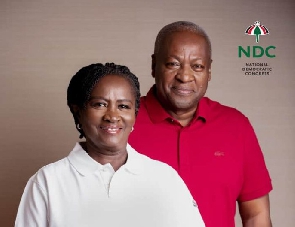Opinions of Thursday, 12 June 2014
Columnist: Sakara, Michael Abu
Sakara Speaks: Way Forward From Senchi
Much has been said about the recent national economic forum but clarity is missing from the debate and in some respects the outcomes. It is clear from the 22 point consensus that the participants ensured the forum was also used to deliberate on national issues that were broader than just the economy. It was in effect a hybrid of a national consultative forum and a national economic forum. Whilst we all agree that the economy is in crisis and needs fixing, the larger and more important need is to find the correct development path for our nation. The most significant consensus from Senchi is that the nation has lost its way and needs to rediscover its vision for a shared national development path within a more inclusive system of governance. No amount of tweaking of the economy and financial system can put us back on the right path without a political accommodation that works better than the "winner takes all" system of governance we have now.
Although the "winner takes all" version of democracy has served to acquaint us with the rule of law it has also opened deep chasms and over polarized Ghana's society. The useful era of the" winner takes all system' is over! It has ceased to be useful because it can't deliver on much of the expected dividends of democracy. It has become a hindrance to itself because of the way we manage it. The challenge is to formulate as soon as possible an alternative political accommodation that will ensure greater inclusion, accountability and continuity of governance between different administrations. The ineffectual platitudes of "we will continue previous projects and we will be inclusive" have run their course. In this regard the forum was necessary and indeed useful if it succeeded in bringing consensus that we need to fix the economy but within a framework that addresses fundamental longer term issues. So focusing on the short term monetary policy issues without initiating a vigorous process for seeking political accommodation for longer term solutions will be a misplaced focus. A working group on the governance issues must seek the solution for a more effective political system as an integral process of redefining the correct development path for our nation. The shared vision that precedes such a long term national development plan may be constructed using the guiding directive principles of state protocol in order to achieve a transformed and more robust economy. The focus on finding a political solution for governance that works better than our current dysfunctional duopoly must be a priority and pursued with the same sense of urgency as the quick fixes we seek for the economy.
The neglect and corruption associated with the unbridled system of the duopoly has deepened the impact of the economic quagmire we have fallen into. We fell into the economic quagmire long before the global crisis because government under the duopoly can't focus long enough on the national interest, it rather focuses is on the next election instead of the next generation.
It is refreshing to see on the horizon an emerging consensus about changing our current system of governance, even if it means amending the 1992 constitution. Our approach should be to assess the effectiveness of various methods of achieving inclusivity, transparency, accountability and continuity. The discourse should be in terms of functionality rather than just adopting one system or the other because it looks more promising. Just because a particular system has worked for others does not mean it will work for us. Any system must be suited to our situation knowing how we conduct ourselves and our traditions. It must take into account the innate characteristics of our multi-ethnic societies and their struggles for supremacy that play out on the political scene. To deny that will be an act of fanciful folly.
The issue may not be whether we revert to a West Minister parliamentary system or continue with an Executive Presidency. The issue is whether we can improve on the existing system of governance now that we know where we abuse it and how easy it is to mismanage it for our selfish and partisan interests. Putting in the checks and balances to correct the excesses and failures of the existing system as per our own experience may be preferable to whole sale adoption of yet another foreign system. Finding ways to fix the inadequacies in our current system of governance is certainly preferable to the continuous howling about the evils of colonialism, imperialism and neo-liberal tendencies.
We must seize the opportunity to take matters into our own hands once again, and use the process of the current constitutional review to change the system as a matter of urgency. In the process of decentralization we must assert the right to directly elect our local government officials (DCE and MDCE). We must also reconsider the number of Districts which are now too many to manage effectively and many are too small to be viable. Perhaps Districts can be reduced in number (60 to 70) and increased in size to contain at least three to four constituencies depending on population density. The regions may subsequently approximate development zones and increased to cover the major ecologies and sub-ecologies for purposes of concentrated long term investment in strategic industries. The suggestion of constituting a permanent membership of the council of state through heads of relevant institutions is a good one. Therefore bringing on board Presidents of Regional House of Chiefs to form a less partisan council of state is desirable. However that should not over represent the proportion of traditional rulers on the council. A house of Lords is not what we seek because we are after all a republic. There is an equally compelling case for representation of the Trade Union on the council of state.
Going forward I therefore support a temporary freeze on the constitutional review to permit an immediate national debate on a more appropriate system of governance for Ghana today. The advocates of Proportional Representation, West Minister Parliamentary system and Executive Presidency should be tasked to negotiate suitable options that can be subjected to national attention for immediate consideration. The pressure groups for election of DCE's and MDCE's by direct universal suffrage must mount demonstrations on behalf of the voiceless for that right now!. A referendum for adoption of an appropriate system of governance should be held if necessary to prepare for the next election. Together we must find a solution to curb the obsessive pursuit of partisan interests instead of the national interest. The pursuit of partisan interests over national interests is now endemic and the infection so severe that even cohesion within parties is vulnerable to power struggles for supremacy. At no time in our history has the national vision been so dim and so vague. We quibble about terms that differentiate us ideologically when we are all engulfed in a fog that blinds us as to who we are and where we are going as a nation. No one group can travel this journey alone, we will all get to our destination together in one form or the other. The kind of Ghana we build will depend on whether we resolve to live up to who we can be or succumb to live down to what we are not!
It is often the case that using the wrong words to describe what you need creates misunderstanding and confusion. Billing the Senchi meeting as an Economic Forum sent the wrong message because our situation demands more than an economic forum. It was too narrow a description of what we needed at this time. We now all realize that "the chips are down" and we need a serious rethink to come up with lasting solutions and not temporary platitudes to make us feel better that something is being done.
We are where we are as a nation because of the choices we have collectively made as a society. Whether by acts of commission or omission we all "rowed the boat to its current location". The choices facing us now are beyond the minute details of how to manage the economy. The economy is managed in a political and social context within a global village. The Senchi consensus has answered the over-riding question of whether the path for our national development since the fourth republic is the one that gives us the most optimal results given the resources at our disposal? The answer from all quarters even those absent should be a resounding NO!!!!. So the next question is what other democratic options are likely to respond more positively to our particular challenges as a nation? Carrying on business as usual just for the purpose of democratically changing administrations without its full dividends is no longer tenable.
If Senchi made us ask this question out loud then it has succeeded in focusing our attention. What we do, not what we say from now on will determine whether the Senchi consensus delivers any real and lasting dividends.
God bless our homeland Ghana!
Signed
Dr Michael Abu Sakara
2012 CPP Presidential Candidate
……………………………………………………………………………………
EMAIL: officeofabusakara@gmail.com












